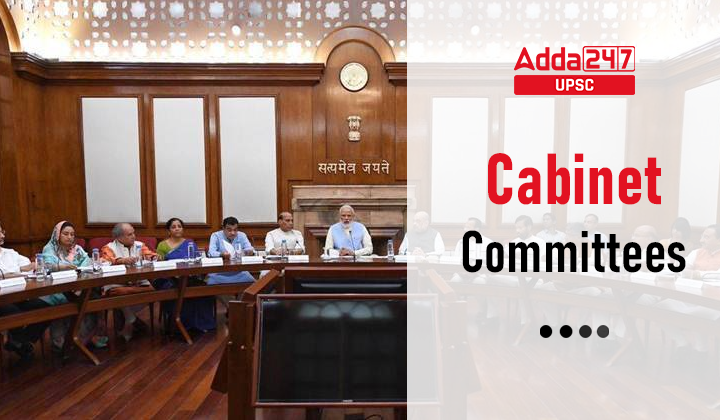Table of Contents
Cabinet Committees: Relevance for UPSC
GS 2: Executive
Cabinet Committees: Why in news?
After the Cabinet Committee on Economic Affairs (CCEA) meeting chaired by Prime Minister Narendra Modi, the government increased the MSP for Rabi Crops.
Cabinet Committees: Which Eight Cabinet Committees are?
- Appointments Committee of the Cabinet.
- Cabinet Committee on Accommodation.
- Cabinet Committee on Economic Affairs.
- Cabinet Committee on Parliamentary Affairs.
- Cabinet Committee on Political Affairs.
- Cabinet Committee on Security.
- Cabinet Committee on Investment and Growth.
- Cabinet Committee on Employment & Skill Development.
Cabinet Committees: Key Points
- All committees except Cabinet Committee on Accommodation and Cabinet Committee on Parliamentary Affairs are headed by the Prime Minister.
- They are extra-constitutional in emergence i.e. they are not mentioned in the Constitution. However, the Rules of Business provide for their establishment.
- The executive in India works under the Government of India Transaction of Business Rules, 1961.
- These Rules emerge from Article 77(3) of the Constitution, which states: “The President shall make rules for the more convenient transaction of the business of the Government of India, and for the allocation among Ministers of the said business.”
- The Prime Minister constitutes Standing Committees of the Cabinet and sets out the specific functions assigned to them. He can add or reduce the number of committees.
- In addition to cabinet committees, several Groups of Ministers (GoMs) are constituted to look into different issues/subjects.
Cabinet Committees: Transaction of Business Rules, 1961
- The executive works under the Government of India Transaction of Business Rules, 1961.
- These Rules emerge out of Article 77(3) of the Constitution, which states: “The President shall make rules for the more convenient transaction of the business of the Government of India, and for the allocation among Ministers of the said business.”
- The Rules mandate the minister-in-charge of a department (ministry) to dispose of “all business allotted to a department under” him or her.
- However, “when the subject of a case concerns more than one department”, no decision can be taken “until all such departments have concurred, or, failing such concurrence, a decision thereon has been taken by or under the authority of the Cabinet”.
Cabinet Committees: What is the Role of Cabinet Committees?
- They are an organizational device to lessen the enormous workload of the Cabinet.
- They facilitate an in-depth examination of policy issues and effective coordination.
- They are based on the principles of division of labor and effective delegation.
- They not only resolve issues and frame proposals for the Cabinet’s consideration, but they also take decisions.
- The Cabinet can, of course, review their decisions.
Cabinet Committees: What are Groups of Ministers?
- Groups of Ministers are ad hoc Committees formed to give recommendations to the cabinet on certain emergent issues and critical problem areas.
- Some of these GoMs are empowered to take decisions on behalf of the Cabinet whereas the others make recommendations to the Cabinet.
- The institution of GoMs has become a viable and effective instrument of coordination among the ministries.
- Ministers heading the concerned ministries are inducted into the relevant GoMs and when the advice is crystallised they are disbanded.
Cabinet approves Auction of IMT/5G Spectrum
Role, Functions & Significance of 8 Cabinet Committees
Cabinet Committee on Appointments
- Cabinet Committee on Appointments is most vital which makes appointments to posts of the three service chiefs, Director General of Military Operations, chiefs of all Air and Army Commands, Director General of Defence Intelligence Agency, Scientific Advisor to the Defence Minister, Director General of Armed Forces Medical Services, Director General of Ordnance Factories, Director General of Defence Estates, Controller General of Defence Accounts, Director of Institute for Defence Studies and Analyses, Solicitor-General, Governor of the Reserve Bank of India, Chairman and Members of the Railway Board, Chief Vigilance Officers in Public Sector Undertakings and Secretariat posts of and above the rank of Joint Secretary in the Central Government.
- This Committee decides on all important empanelments and shift of officers serving on Central deputation.
The Cabinet Committee on Accommodation
- The Cabinet Committee on Accommodation determines the guidelines or rules with regard to the allotment of government accommodation.
- It also takes a call on the allotment of government accommodation to non-eligible persons and organisations as also the rent to be charged from them.
- It can consider the allotment of accommodation from the General Pool to Members of Parliament.
- It can consider proposals for shifting existing Central Government Offices to locations outside the capital.
The Cabinet Committee on Economic Affairs
- The Cabinet Committee on Economic Affairs is supposed to review economic trends, problems and prospects “for evolving a consistent and integrated economic policy”, coordinate all activities requiring policy decisions at the highest level, deal with fixation of prices of agricultural produce and prices of essential commodities.
- It considers proposals for investment of more than Rs 1,000 crore, deal with industrial licensing policies and review rural development and the Public Distribution System.
The Cabinet Committee on Parliamentary Affairs
- The Cabinet Committee on Parliamentary Affairs draws the schedule for Parliament sessions and monitors the progress of government business in Parliament.
- It scrutinises non-government business and decides which official Bills and resolutions are to be presented.
The Cabinet Committee on Political Affairs
The Cabinet Committee on Political Affairs addresses problems related to Centre-state relations. It also examines economic and political issues that require a wider perspective but have no internal or external security implications.
The Cabinet Committee on Security
- The Cabinet Committee on Security deals with issues relating to law and order, internal security and policy matters concerning foreign affairs with internal or external security implications.
- It also goes into economic and political issues related to national security.
- It considers all cases involving capital defence expenditure more than Rs 1,000 crore.
- It considers issues related to the Department of Defence Production and the Department of Defence Research and Development, Services Capital Acquisition plans and schemes for procurement of security-related equipment.
The Cabinet Committee on Investment
- The Cabinet Committee on Investment “identifys key projects required to be implemented on a time-bound basis”, involving investments of Rs 1,000 crore or more, or any other critical projects, as may be specified by it, with regard to infrastructure and manufacturing.
- It prescribes time limits for giving requisite approvals and clearances by the ministries concerned in identified sectors.
- It monitors the progress of such projects.
The Cabinet Committee on Employment
- The Cabinet Committee on Employment and Skill Development provides “direction to all policies, programmes, schemes and initiatives for skill development aimed at increasing the employability of the workforce for effectively meeting the emerging requirements of the rapidly growing economy and mapping the benefits of demographic dividend”.
- The panel sets targets for expeditious implementation of all skill development initiatives by the ministries and to periodically review the progress in this regard.



 TSPSC Group 1 Question Paper 2024, Downl...
TSPSC Group 1 Question Paper 2024, Downl...
 TSPSC Group 1 Answer key 2024 Out, Downl...
TSPSC Group 1 Answer key 2024 Out, Downl...
 UPSC Prelims 2024 Question Paper, Downlo...
UPSC Prelims 2024 Question Paper, Downlo...





